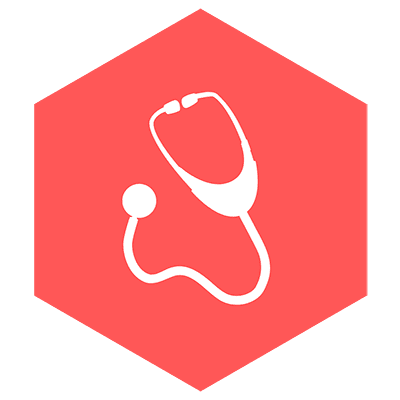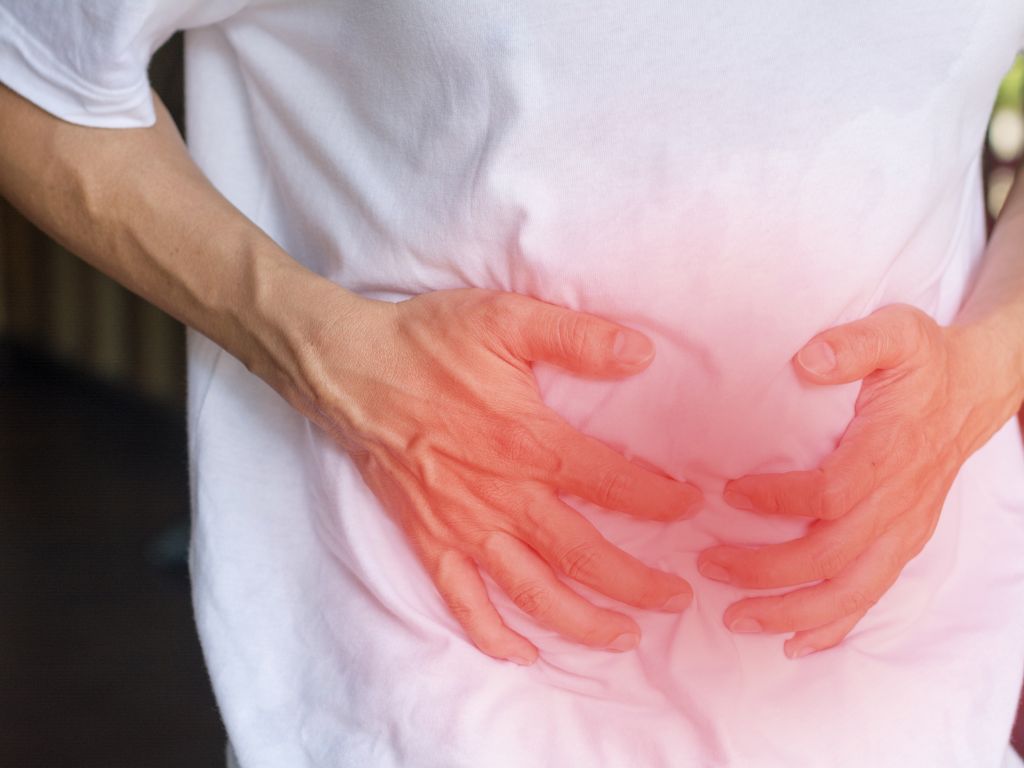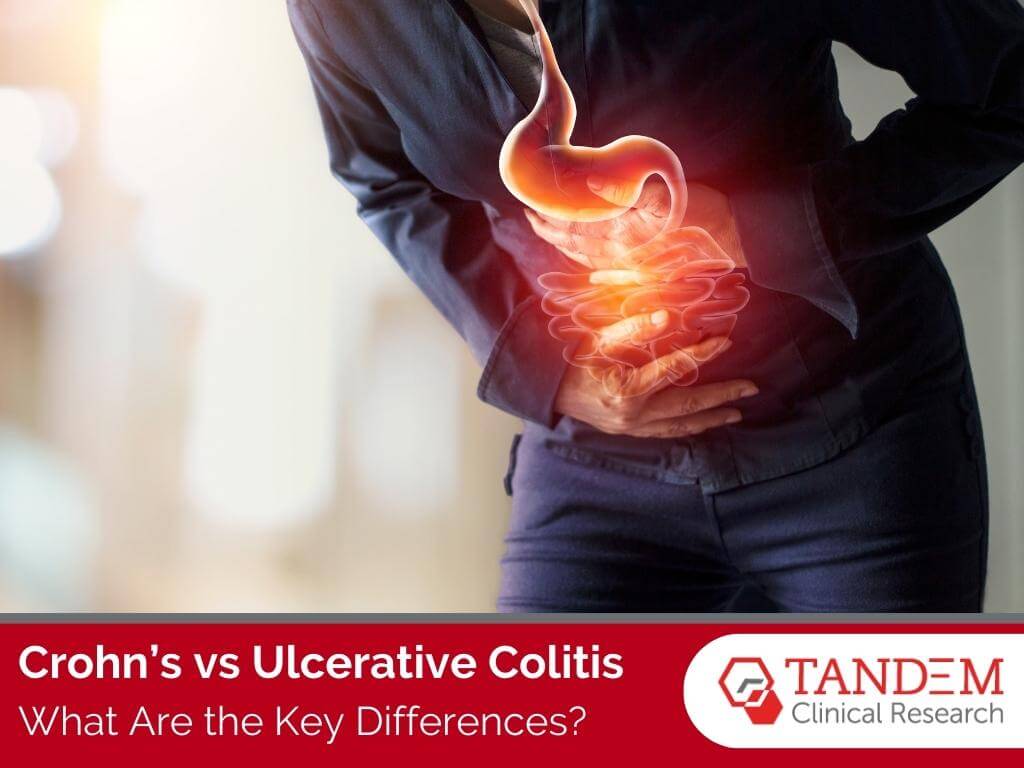It’s estimated nearly 1 in every 100 Americans will be diagnosed with inflammatory bowel disease, either in the form of Crohn’s disease or ulcerative colitis.
Crohn’s disease is an autoimmune disorder that can affect any part of the GI tract, from the mouth to the anus. Most commonly, it impacts the end of the small bowel and the beginning of the colon. The disorder can affect the thickness of the bowel wall, triggering inflammation in the intestines.
There are multiple types of Crohn’s disease, including:
- Ileocolitis
- Ileitis
- Gastroduodenal Crohn’s Disease
- Jejunoileitis
- Crohn’s Colitis
- Perianal Crohn’s disease
In all types of Crohn’s disease, an abnormal immune system response contributes to chronic inflammation of the digestive tract. This can lead to a wide range of symptoms, from severe diarrhea and abdominal pain to weight loss and poor nutrition.
What Causes Crohn’s Disease?
Researchers don’t know exactly what causes Crohn’s disease, but it is believed to be triggered by a combination of genetic and environmental factors. Those who have a family history are at the highest risk of developing the condition.
Individual immune systems may largely influence Crohn’s disease. Typically, this part of the body protects us from harmful bacteria and viruses – but sometimes, people’s immune systems mistakenly attack healthy digestive tract tissue.
Ultimately, more research is needed to fully understand the precise causes of Crohn’s disease, as well as the complex interplay of genetic and environmental factors that contribute to its development.
Who Typically Gets Crohn’s Disease?
Anyone can develop Crohn’s disease. However, most IBDs are diagnosed in young adults between the ages of 15 and 35. When both parents have inflammatory bowel disease, their children have a 35% risk of developing Crohn’s disease
In the United States, Crohn’s disease appears more frequently in females than it does in males. White people and Ashkenazi Jews also develop Crohn’s at a higher rate than other ethnicities.
Although the risk factors for Crohn’s disease aren’t clearly established, we do know that family history and cigarette smoking are two potential factors in the development of the disease.
According to the Crohn’s and Colitis Foundation of America, active smokers are more than twice as likely as nonsmokers to develop Crohn’s disease. Smoking may also decrease the effectiveness of Crohn’s treatment and increases flares-ups.
Symptoms of Crohn’s Disease
The symptoms of Crohn’s disease can vary from person to person, and they tend to depend on the location and severity of the inflammation. Some of the most common symptoms include…
The Different Types of Crohn’s Disease
Ileocolitis
Ileocolitis is the most common type of Crohn’s disease, affecting about 50% of patients. This type of Crohn’s impacts the ileum (the end of the small intestine) and the colon (the large intestine).
Ileitis
Ileitis impacts roughly a quarter of people with Crohn’s disease. This type affects the ileum (the end of the small intestine).
Gastroduodenal Crohn’s disease
Gastroduodenal Crohn’s disease affects the stomach and duodenum (the first part of the small intestine). This form is less common but still affects an estimated 5% of people with Crohn’s disease.
Jejunoileitis
Jejunoileitis affects the jejunum (the middle part of the small intestine) and the ileum (the end of the small intestine). Although this form of Crohn’s is uncommon, it is associated with a higher morbidity rate and can be more difficult to manage.
Crohn’s Colitis
Crohn’s colitis affects the colon (the large intestine). It is sometimes also referred to as granulomatous colitis and accounts for an estimated 20% of Crohn’s diagnoses.
Perianal Crohn’s disease
Perianal Crohn’s disease affects the skin around the anus and may cause symptoms such as anal fissures, abscesses, and fistulas. This type of Crohn’s is common in the most severely impacted patients and, in some cases, requires surgery to treat.
Can You Have More Than One Type of Crohn’s?
Not only can the type of Crohn’s disease a person has changed over time, but many patients have more than one type of Crohn’s simultaneously.
Diagnosis of Crohn’s Disease
Diagnosing Crohn’s disease can be complicated, as the symptoms can be similar to those of other gastrointestinal disorders. To diagnose Crohn’s disease, most doctors perform a physical exam and order blood tests, stool tests, and imaging tests (such as a CT scan or MRI).
In some cases, healthcare providers also call for a colonoscopy or endoscopy to take a look inside the digestive tract.
Match With Crohn’s Disease Clinical Trials
Have you been diagnosed with Crohn’s disease? You may qualify for a trial near you. Tandem Clinical Research can match you with:
- Research groups in your area
- Innovative treatments
- Trailblazing clinical studies
Treating Crohn’s Disease
Unfortunately, there is currently no cure for Crohn’s disease. However, there are several treatment options available that can help patients manage their symptoms and improve their quality of life with Crohn’s.
Medications
Several types of medications can be used to manage the symptoms of Crohn’s disease, including:
- Anti-inflammatory drugs such as mesalamine and corticosteroids
- Immunosuppressants such as azathioprine and methotrexate
- Biologic therapies such as infliximab, vedolizumab, and adalimumab
- Antibiotics to treat bacterial infections
Nutritional Therapy
This form of treatment involves adjusting the diet of a Crohn’s patient to manage their symptoms. In some instances, this means switching to a low-fiber or low-residue diet to reduce the strain on the digestive tract.
In other (possibly more severe) cases, the patient may need to take nutritional supplements or receive nutrition through a feeding tube.
Complementary Therapies
Complementary therapies may help alleviate some of the symptoms of Crohn’s disease. These can include activities like:
- Meditation
- Acupuncture
- Massage
- Yoga
These “at-home” therapies are often used in conjunction with other treatment options. If you are interested in learning what you can do outside of the medical field to treat your Crohn’s symptoms, discuss the possibilities with your healthcare provider.
Surgery
Surgery is sometimes necessary to treat complications of Crohn’s disease, especially when strictures, fistulas, or abscesses form. Some patients also undergo surgery to remove sections of the intestine that have been damaged by the disease.
Surgery is typically only recommended after other treatment options have been tried. Most healthcare providers will prescribe medications, diet changes, and complementary therapies before resorting to surgical treatments.
It’s important to note that not all treatment options will be appropriate for every person with Crohn’s disease. The best course of treatment will depend on the severity of the disease, the individual’s symptoms and medical history, and their preferences and lifestyle.
Supporting Friends or Family Members With Crohn’s
If you have a loved one with Crohn’s disease, you may be wondering how you can offer support and help them manage their symptoms. Here are a few of the best things you can do…
Educate Yourself
Learn as much as you can about Crohn’s disease, including its symptoms, causes, and treatment options. This will help you better understand what your friend or family member is going through and can help you provide support throughout their journey.
Offer Practical Support
One of the most helpful things you can do is assist with practical tasks, such as grocery shopping, meal preparation, or running errands. These may seem like simple chores, but they can be difficult for someone with Crohn’s disease, especially during a flare-up.
Be Flexible
People with Crohn’s disease may need to cancel plans suddenly due to their symptoms. Be understanding and flexible, and don’t take it personally if they have to reschedule or cancel plans.
Also, try to be flexible when it comes to their diet. People with Crohn’s disease may need to eat certain foods and avoid others to prevent flare-ups. Be mindful of their dietary restrictions when planning meals or outings that involve food.
Work on Your Listening Skills
Crohn’s disease can be a challenging condition to live with – and your loved one may need someone to talk to about their experiences. Offer a non-judgmental ear when they need to vent or share their feelings and don’t leap in with advice unless they ask for it.
Be Positive and Supportive
Lastly, remember to be a source of positivity in this person’s life. Living with a chronic illness can feel defeating, and your friend or family member may need a little extra encouragement (or a lot).
Let them know that you’re there for them and that you believe they can still obtain a great quality of life with their inflammatory disorder. The key is to make them feel less isolated and better equipped to manage their symptoms, even though there is no cure for Crohn’s disease.
Crohn’s Disease Clinical Trials
If you have been diagnosed with Crohn’s disease, you are in a unique position to participate in clinical studies and help researchers obtain valuable information – both for your benefit and for the future care of others with inflammatory bowel disorder.
Researchers are currently studying many aspects of IBC, including Crohn’s disease and ulcerative colitis. This includes the assessment of:
- new treatments for Crohn’s
- how genes and environmental factors increase the risk of Crohn’s
- how inflammatory bowel diseases develop and progress
All of the clinical trials we partner with are carried out in reputable hospitals, universities, and research centers. If you’re interested in participating, reach out to learn about clinical trials in your area.
Match with Crohn’s Disease Clinical Trials
Tandem Clinical Research connects patients with clinical trials for pharmaceutical, biotech, and medical device companies. If you live near New Orleans, New York City, or Orlando, we’ll help you find and apply for trials within your immediate area.
There might not currently be a cure for Crohn’s disease, but significant research is taking place to discover the best treatment options.
Consider joining a clinical trial to contribute to the scientific study of Crohn’s disease and other inflammatory bowel diseases.



